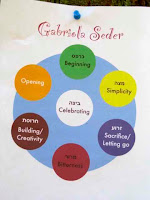We’ve been back now almost two weeks. It
feels like we are just starting to gather the edges of our parachute together
after landing.
 |
| seder in our yurt |
Gabriola welcomes us with a wide embrace.
The rains subside after the first few days and the sun begins to shine brightly
on the day our friends from Toronto arrive to be with us for Passover. Though
we haven’t really had the time to settle in, I feel the comfort in the
familiarity of our forest home. As I wander, I notice which trees have survived
the relatively mild winter, and which have fallen. I begin to plan a clean up
and preparation for planting. Living outside means that our home is never clean, and that it is always clean. It’s Nature. It is what it
is!
I’m realizing how easily my spiritual
expression emerges in my daily life. So much of who I am is expressed in my
relationship with my natural surroundings. I think I’ve always been this way,
and, in my attempt to not think so much, I make more opportunity to experience.
I think my relationship with India and Indians has further inspired that.
We lost our seder plate this year.
Typically the seder plate holds the same items, no matter on whose table it
sits. There is an egg symbolizing new birth, eternity, beginnings and endings.
There’s karpas (a green vegetable) to remind us that Spring is here and it is a
time of new growth. There’s maror (bitter herbs) to represent the suffering
that our people experienced while being enslaved in Egypt. Charoset (a mixture
of dried fruits, nuts, red wine and honey) symbolizes the mortar that the Jews
had to make in order to build the pyramids. And, matzah, the bread of
affliction and simplicity.
This year to replace our lost seder plate,
we invited tour guests to begin our seder with a scavenger hunt in search of
personal meaning to the traditional components of the plate that sits on the
table all evening.
By early afternoon on Monday, everyone
coming had arrived on the island. We gathered together to burn the chometz (last
bits of bread) and begin the eight days of Passover, a holiday dedicated to
freedom. We presented everyone with a list of words for consideration for
finding items to add relevance to our seder plate. Simplicity, Opening, Sacrifice/Letting Go,
Building/Creativity, Bitterness, Celebrating, were all concepts that we created
derived from the original meanings.
For the next two hours all of us carried on
with our day. We cooked and went for walks. We set the table for seder. We
talked together and sat, and all through the day, with the list of words in our
thoughts, we collected items that we each considered to be representations of
the words on the list. Each item got added to the seder plate.
 |
| Paul, Micah, Seyna, Maeve, Lindsay, me, Jacquie, Gabriella, Elyse and Baruch |
The seder plate that evening was a
reflection of our own personal understanding of the meaning of Passover. We had
fresh flowers and entwined branches from trees. Twigs with new buds and seeds dug up by animals from last
year’s planting. There was a clay statue of a dancing woman and an avocado pit.
Sparkles and dust, and shells from the ocean, each representing meaning. It was
traditional in a way, and personal and alive. Using the Haggadah to follow the
order of the seder, we were all involved. Each person participated fully.
Isn’t that what it’s all about? Recently I
had a conversation with someone about organized religion. “How can I be thankful for freedom when
there are so many enslaved people in the world?” he questioned.
 |
| Plagues? |
Our world is not perfect. There are bad
things that happen everywhere, and people who do bad things.
In my life, I can only strive to be a good
person. I want to live with love for myself, for my family, for my community
and for my world. I want to give compassionately, intentionally and openly. I
want to continue to learn, teach and explore. I want to work towards fairness,
peace, and happiness for everyone, all over our Mother Earth. I don’t have to
be Jewish to do that. I don’t have to be Hindu or Buddhist or Muslim. And, I
could be them all! I just need adhere to the basic criteria of being a good
person. Religion, then, becomes a way of practising those skills.
I am grateful for these next few days of
Passover. As I restrict my diet for the next 8 days, I am mindful that there
are people in the world who are not free. I remain grateful for the
opportunities to give of my time, energy, wisdom and love, to connect with
others to encourage change toward fairness and respect and eliminate suffering everywhere.
I appreciate the many friends and acquaintances I have throughout the world and
the amazing technology that allows us to connect and maintain those relationships.
I feel strong and eager and intend to keep healthy so I can continue to learn
and teach and give. I am energized and inspired by my family, who each, in
their own way feeds me with love and the security of support and confidence.
And, as I sat down at the seder table that night, I gave thanks for the bounty
of my life. Chag Sameach to all!























